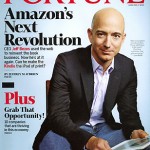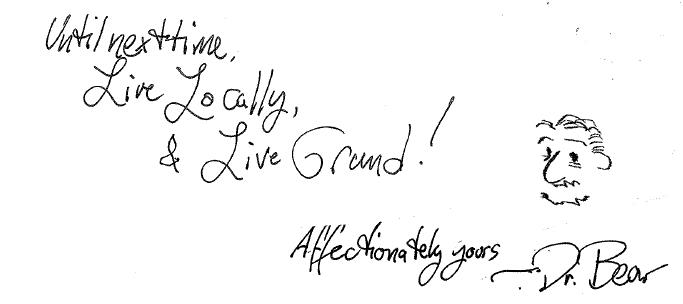Bezos.
 I’ve been thinking about Jeff Bezos this week, in part, because I was also trying to teach about Plato’s Philosopher Kings.
I’ve been thinking about Jeff Bezos this week, in part, because I was also trying to teach about Plato’s Philosopher Kings.
Bezos, for those of you who don’t know, is an evil Sith Lord ruling an all-powerful empire bent on destroying anything that is beautiful and of value to us.
No, of course not. He is, however, the founder and CEO of Amazon.
What he managed to do was found a company which could take advantage of the strength of the internet—ease of ordering, convenience—and couple that with the ability to manage a huge amount of inventory—including inventory he did not actually have to possess or control—and the new possibilities of rapid shipping. By coordinating all of these parts better than anybody had managed before him, and by using the volume and the lack of actual inventory to keep costs incredibly low, and by coupling these with amazingly good customer service, he managed to build an unequaled on-line bookstore, and then a larger on-line market place, and become the first realistic leader in the electronic book business—a business which played to Amazon’s strengths, eliminating the problems of delivery and inventory, but adding the challenge of actually having to design, build, and maintain a physical product: the kindle.
This is a charitable interpretation, but, I think, an accurate one.
I’ve been a book customer since before I can remember.
I’ve worked in several book stores.
I want to disdain Mr. Bezos, because Amazon is driving bookstores out of business.
But I can’t; he is getting books to people—either electronically or in the mail—with great efficiency, and at a lower cost. How are we to fault that?
Besides, he can get me stuff nobody else can, and Wow! Does Amazon have great customer service!
As I said, I’ve been teaching a seminar class on Plato’s Republic, his utopian vision where decisions are made for us by wise, benevolent rulers.
So, perhaps, we should allow businesses to be dominated by those wise folks who can figure out how to make it work better, how to make it work best, and let them do what they do best. Bezos is sharp, he has read the market well, he offers a quality service, and he does something that is dear to my heart: he gets the written word to people.
However, in doing so, he has forever changed the business of books.
 There are unintended consequences to any series of choices, but with a shift of this magnitude there will be even greater consequences.
There are unintended consequences to any series of choices, but with a shift of this magnitude there will be even greater consequences.
We no longer browse shelves in the way we used to—there is no longer the serendipitous moment when we pick up a random book because it strikes our fancy, and begin to leaf through it. Sure, we can find new books on-line, perhaps even sample some pages, but it is harder to get captured in the ruffling of pages that brings us to a sentence or story that captivates us.
There still can be folks to discuss and recommend books—chat rooms, recommendations, posts, etc.—but these are read in the same way the sample is read: not with the enthusiasm of a flesh & blood human being handing us a book and saying “You have to read Helene Wecker’s The Golem and the Jinni!” (http://www.youtube.com/watch?v=msy1ctlRh4Q) I have a friend who actually remembers the names of booksellers at a local Indie and looks for recommendations from her favorites. This is the kind of interaction a local brick & mortar store can give. I have seen it happen on-line as well, but I still think it happens best face to face.
Furthermore, Amazon is primarily a distribution company, and because of its success has been able to dominate the companies which actually produce the product, companies which have greater risk in accumulating inventory, and greater expenses up front. Although Amazon has taken its toll on chain booksellers like Borders (rest in peace) and Barnes & Noble (bless their hearts)—as they, in turn, wiped out smaller bookstores, its greater long term impact—as well as the impact of the move to digital books in general—will be upon publishers, because this will affect the way books are actually produced, eliminating editors and other ways of cultivating talent.
The greatest danger, however, might be one inherent to success and centralization:  markets dominated by a single or even just a few corporations are unwieldy and unstable. Having the decisions about the future of an entire industry made in one or two board rooms—whether Amazon or Monsanto—is not very different from having decisions made by a centralized Politburo committee.
markets dominated by a single or even just a few corporations are unwieldy and unstable. Having the decisions about the future of an entire industry made in one or two board rooms—whether Amazon or Monsanto—is not very different from having decisions made by a centralized Politburo committee.
Freedom aside, a corporation as big as Amazon cannot turn on a dime. It would be nice if those leaders were self-less, all-wise philosopher kings who were capable of making good choices, but they are humans, like we are, and it is hard to judge the unintended consequences of the decisions they make. Unlike the humans who are actually interacting with local customers daily, and have small enough operations to make changes, corporations change slowly, and react slowly.
What can we do?
Well, support alternatives!
Buy local.
If you have to choose, buy regional, since they are more likely to be in touch with the local economy, and with local producers.
Buy Indie.
Independent booksellers and food producers are outside of the decision making process of the corporations, although they are still influenced by it. They are closer to you, and able to adjust their courses based upon what is happening “on the ground” rather than having to wait for decisions from a detached board room. They are also more likely to cultivate diversity, leaving room on their shelves (or in their fields) for genetic variation, so that we won’t just be stuck with pasty golden delicious apples and 50 Shades of Gray.
So buy local. Drop by CSAs like Trosley Farm or a road-side produce vendor.
Share a local microbrew at a local restaurant like The Acoustic Coffeehouse or the Philosophy Bistro.
If you can’t find what you need locally, find an independent dealer like Malaprop’s Bookstore not too far away, or find an independent business on-line like Glynne’s Soaps and use Amazon’s tools against him.
